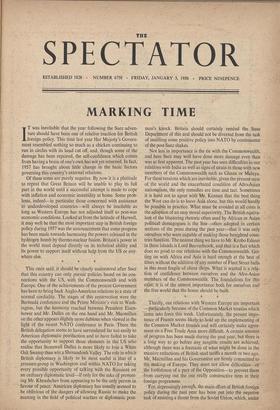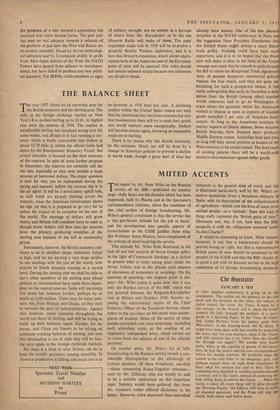MARKING TIME
IT was inevitable that the year following the Suez adven- ture should have been one of relative inaction for British foreign policy. This time last year Her Majesty's Govern- ment resembled nothing so much as a chicken continuing to run in circles with its head cut off, and, though some of the damage has been repaired, the self-confidence which comes from having a brain of one's own has not yet returned. In fact, 1957 has brought about little change in the basic factors governing this country's external relations.
Of these some are purely negative. By now it is a platitude to repeat that Great Britain will be unable to play its full part in the world until a successful attempt is made to cope with inflation and economic instability at home. Some prob- lems, indeed—in particular those concerned with assistance to underdevelobed countries—will always be insoluble as long as Western Europe has not adjusted itself to post-war economic conditions. Looked at from the latitude of Harwell, it may well be that the most important step in British foreign policy during 1957 was the announcement that some progress has been made towards harnessing the powers released in the hydrogen bomb•by thermo-nuclear fusion. Britain's power in the world must depend directly on its technical ability and its power to support itself without help from the US or any- where else.
* * * This once said, it should be clearly understood after Suez that this country can only pursue policies based on its con- nections with the US, with the Commonwealth and with Europe. One of the achievements of the present Government has been to bring back Anglo-American relations to a state of normal cordiality. The stages of this resurrection were the Bermuda conference and the Prime Minister's visit to Wash- ington, but the harmony reached between President Eisen- hower and Mr. Dulles on the one hand and Mr. Macmillan on the other appears slightly more dubious when viewed in the light of the recent NATO conference in Paris. There• the British delegation seems to have surrendered far too easily to American diplomatic petrifaction and to have failed to take the opportunity to support those elements in the US who realise that Stonewall Dulles is more likely to lose a White Oak Swamp than win a Shenandoah Valley. The role in which \ British diplomacy is likely to be most useful is • 'that of a pressure-group in Washington and within NATO for taking every possible opportunity of talking with the RussianS on an ordinary diplomatic level—if only for the sake of prevent- ing Mr. Khrushchev from appearing to be the only person in favour of peace. American diplomacy has usually seemed to be oblivious of the dangers of allowing Russia' to make the running in the field of political warfare or diplomatic post- man's knock. Britain should certainly remind the• State Department of this and should not be diverted from the task of instilling some positive policy into NATO by continuance of the post-Suez shakes.
Not less in importance is the tie with the Commonwealth, and here Suez may well have done more, damage even than was at first apparent. The past year has seen difficulties'in our relations with India as well as signs of strain in those with new members of the Commonwealth such as Ghana or Malaya. For these tensions which are inevitable, given the present state of the world and the exacerbated condition of Afro-Asian nationalism, the only remedies are time and tact. Sometimes it is hard not to agree with Mr. Kennan that the best thing the West can do is to leave Asia alone, but this would hardly be possible in practice. What must be avoided at all costs is the adoption of an easy moral superiority. The British equiva- lent of the blustering rhetoric often used by African or Asian political demagogues, is the line—often adopted in certain sections of the press during the past year—that it was only ourselves who were capable of making those benighted coun- tries function. The nearest thing we have to Mr. Krobo Edusei in these islands is Lord Beaverbrook, and that is a fact which does no good to our relations with the Commonwealth. Get- ting on with Africa and Asia is hard enough at the best of times without the addition of any number of Fleet Street bulls in this most fragile of china shops. What is wanted is a rela- tion of confidence between ourselves and the -Afro-Asian members of the Commonwealth. The foundations, for this exist; it ,is of the utmost importance both for ourselves and the free world that the house should be built.
* *
Thirdly, our relations with Western Europe are important —particularly because of the Common Market treaties which came into force this week. Unfortunately, the present impo- tence of France seems likely •to hold up the implementing of the Common Market treaties and will certainly make agree- ment on a Free Trade Area more difficult. A certain amount of progress has been made during the past year, but there is a long way to go before any tangible results are achieved, although there was a foretaste of what might be done in the massive reductions of British steel tariffs a month or two ago. Mr. Macmillan and his Government are firmly committed to the making of Europe. They must not allow difficulties—or•the foolishness of a part of the Opposition—to prevent them from carrying out the one really constructive item in their foreign• programme.
For, depressingly enough, the main effort of British foreign policy during the past year has been put into the negative task of resisting a threat from the Soviet Union, which, under
the guidance of a new sorcerer's apprentice, has assumed ever more diverse forms. The past year has seen no real advance towards a solution of the problem of just how the West and Russia are to co-exist amicably. Faced by Soviet technologi- cal advances and by Communist ability to profit from Afro-Asian distrust of the West, the NATO Powers have passed from alliance to interdepen- dence, but have failed to produce any new politi- cal initiative. Yet IRBMs, while excellent as signs of military strength, are no answer to a barrage of letters from Mr. Khrushchev or to the use Moscow Radio will make of them. The most important single task in 1958 will be to evolve a properly flexible Western diplomacy, and it is here that Britain's experience, which allows appre- ciation both of the American and of the European point of view, will be essential. Our voice should not remain unheard simply because our statesmen are afraid to shout.











































 Previous page
Previous page